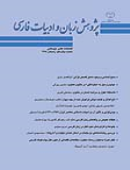بومیگرایی و تأثیر آن بر ادبيات داستاني معاصر ایران(1357ـ 1320) *
محورهای موضوعی : پژوهشهای ادبیات کلاسیک ایران
1 -
کلید واژه: نقد ادبي جريانشناسي ادبيات داستاني معاصر بوميگرايي,
چکیده مقاله :
بوميگرايي واكنش روشنفكراني بود كه ميخواستند مخاطبان خود را به اصالتها و ريشههايشان توجه دهند، بنابراين كشورهاي فراواني كه در معرض استعمار قرار داشتند، به اين موضوع توجه كردند و طبيعتاً جريانهاي گوناگون روشنفكري در ايران نيز به آن بيتوجه نماندند. در بررسي جريانهاي داستاني پيش از انقلاب، با جريان بوميگرايي مواجهيم، جرياني كه معمولاً منتقدان به آن توجه نكردهاند. در داستانهاي اين جريان به نقد بيگانگان و دولت همراه با بيگانگان و توجه دادن مردم به ريشههاي خود توجه شده است. در اين مقاله ضمن نظري مختصر به شرايط تاريخي، اجتماعي، فرهنگي و ادبي ايران در سالهاي 1320 تا 1357مؤلفههاي موجود در داستانهاي اين جريان برشمرده شدهاست. بيگانهستيزي، توجه به هويت ايرانياسلامي و تقابل اين مؤلفهها با موضوع مدرنيسم از عمدهترين مؤلفههاي داستانهاي بوميگراست. بررسيها نشان ميدهد توجه به جريان بوميگرا در دهه 20 و 30 شمسي كمتر از دهه 40 به بعد است. سياستهاي محمدرضا پهلوي در اين دو دهه و نوع برخورد او با روشنفكران شرايطي را رقم ميزند كه در نهايت منجر به بيتوجهي به اين جريان در دهههاي 20 و 30 ميشود. تأثيرات جريانهاي روشنفكري بخصوص تفكرات آلاحمد و شريعتي و تغيير شرايط كشور از سال 42 به بعد به اين جريان در دهههاي 40 و 50 رونق ميبخشد.
Nativism was a reaction from the intellectuals who aimed at catching the attentions of their addressees to their roots and origins. Many countries experiencing colonialism, turned their attention to the subject, and naturally, different intellectual communities in Iran responded to it, as well. Analysing pre-Revolution literary movements, we can find nativism, a movement usually ignored by the critics. The stories written during this movement criticizes the others, and the government following the others, and draw the people’s attention to their roots. In the present article, reviewing briefly Iran’s historical, social, cultural and literature conditions during the years 1320 to 1357 (S.H.), we have shown the main features of these stories, including, nativism, caring about Iranian-Islamic identity. The research reveals that during the 1320s and 1330s, the feature of nativism fades. The policies of Pahlavi regime in these two decades, and the way he treats the intellectuals create conditions which ultimately leads in their indifference to nativism. But the influence of the intellectual movements, particularly, the thoughts of Al Ahmad and Shari’ati, and the changes in the social condition of the country from 1342 on strengthens it in 1340s and 135s.


